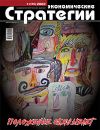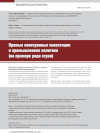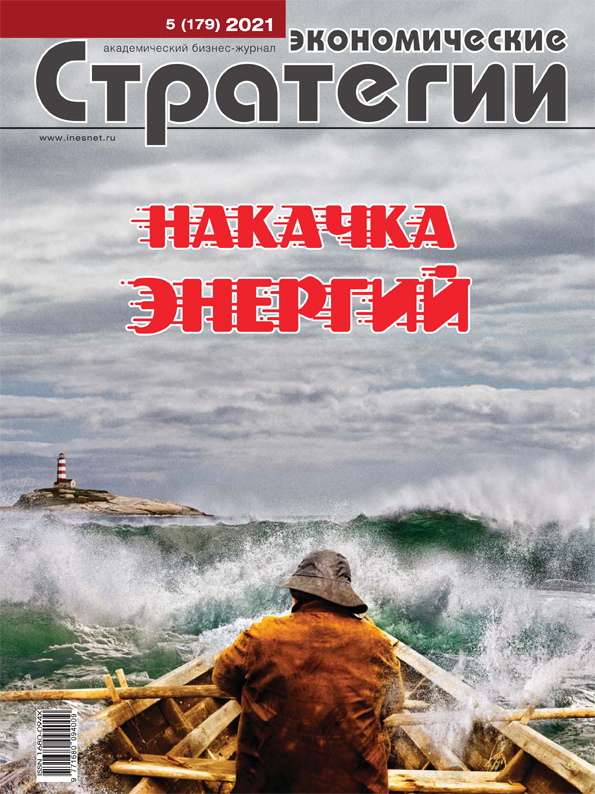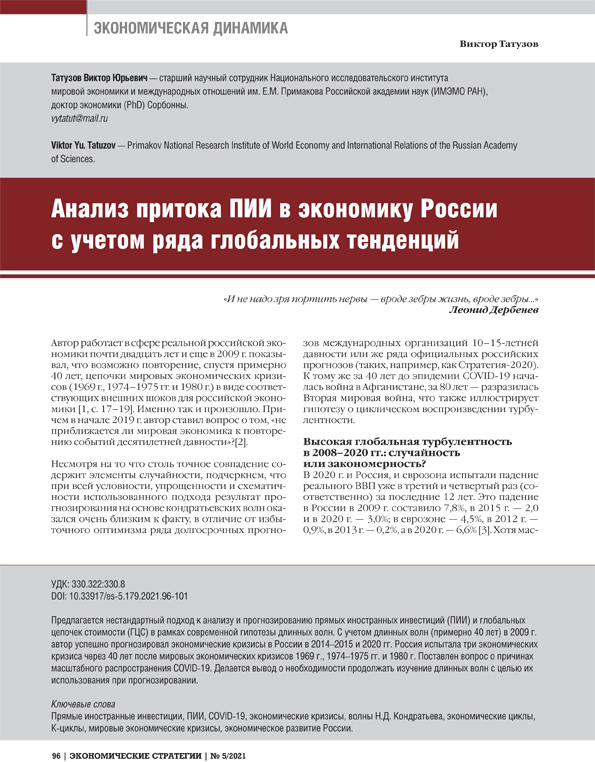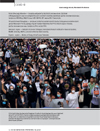Foreign Direct Investment and Industrial Policy (Based on Examples of Certain Countries)
DOI: https://doi.org/10.33917/es-5.185.2022.6-11
The goal of the study is an attempt to rethink the role of Foreign Direct Investment, Industrial Policy and others phenomenon.
The author propose a new analysis of them in today’s conditions and circumstances. This article uses statistics published by OECD and IMF. The article pays particular attention to different approaches of certain countries (USSR, Russia, Italy, South Korea) in the field of import of Foreign Direct Investment and in the field of the Industrial Policy. Based on many years of the author’s experience in the Russian banking sphere and Russian business, the author puts forward certain economic advice to regulators in Russia.
References:
1. IMF. World Economic Outlook — Rising Caseloads, a Disrupted Recovery, and Higher Inflation. Washington, DC, 2022.
2. IMF. World Economic Outlook — War Sets Back the Global Recovery. Washington, DC, 2022.
3. Soboleva Inna. Les experts russes redoutent une guerre mondiale d’ici dix ans. FR. Russia Beyond, 2013, April 16, available at: https://fr.rbth.com/tech/2013/04/16/les_experts_russes_redoutent_une_guerre_mondiale_dici_dix_ans_23165.
4. Glazyev S. How to win the war. Top War, 2014, July 26, available at: https:www.en.topwar.ru.
5. Kondratieff N. The World Economy and its Conjunctures during and after the War. Moscow, International Kondratieff Foundation, 2004.
6. Trotsky L. La courbe du d velopppement capitaliste. Marxists, 1923, Avril 21, available at: https://www.marxists.org/francais/trotsky/oeuvres/1923/04/lt19230421.htm.
7. Pokidchenko M.G. Sushchestvuet li ekonomicheskii tsikl? [Is there an Economic Cycle]. Voprosy teoreticheskoi ekonomiki, 2017, no 1, pp. 66–73, available at: http://questionset.ru/files/arch/2017/2017-N1/VTE_2017_1.pdf.
8. Ershov M.V, Lokhmachev V.F., Tatuzov V.Yu, Tanasova A.S. Global’nyi krizis (sravnitel’nyi analiz tsiklicheskikh protsessov) [About Tendencies of Global Crisis]. Bankovskoe delo, 2009, no 5, pp. 16–20, available at: https://www.elibrary.ru/contents.asp?id=33338082.
9.FDI in Fugures. Paris, OECD, 2022, April, available at: www.oecd.org.
10. Putin V. Economic Tasks. Working Day, 2012, January, 30, available at: http://archive.premier.gov.ru/eng/events/news/17888/
11. Ministerial Decree No. 328 validating the State Program of the Russian Federation “Development of industry and increase of its competitiveness” (аpril 2014), available at: http://extwprlegs1.fao.org/docs/pdf/rus170671.pdf.
12. Federal Law No. 488-FZ of December 31, 2014 “On Industrial Policy”. FAO, available at: https://www.fao.org/faolex/results/details/ru/c/LEX-FAOC170671/
13. Vstrecha s chlenami pravitel’stva [Meeting with Governments Members]. Ofitsial’nyi sait Prezidenta RF, 2022, 23 marta, available at: http://en.kremlin.ru/events/president/news/68037.
14. Idrisov G.I. Promyshlennaya politika Rossii v sovremennykh usloviyakh [Towards Modern Industrial Policy for Russia]. Moscow, Izd-vo Instituta Gaidara, 2016.
15. Strukturno-investitsionnaya politika v tselyakh ustoichivogo rosta i modernizatsii ekonomiki: Nauchnyi doklad [Structural and Investment Policy for Sustainable Growth and Modernization of the Economy: Scientific Report]. Pod red. V.V. Ivantera. Moscow, INP RAN, 2016.


